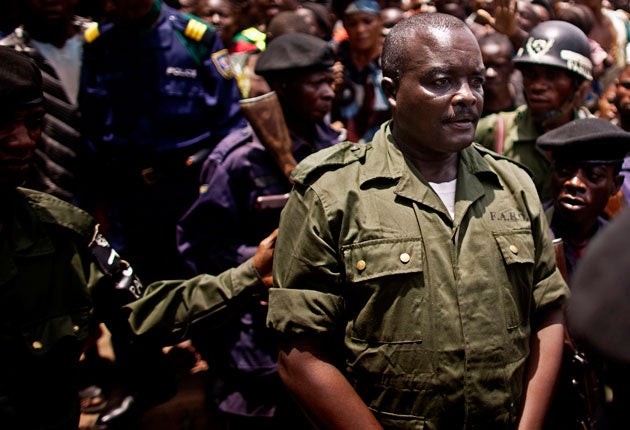Soldiers jailed for mass rape as Congo finally acts on abuse

In a landmark case human rights activists hope will reduce a culture of impunity for sex crimes in the beleaguered central African country, a military court has convicted a lieutenant colonel in the Congolese army to 20 years' imprisonment for mass rapes committed on New Year's Day.
Alongside Lieutenant Colonel Kibibi Mutware, a former rebel absorbed into government forces, three other officers received 20-year sentences. Another five soldiers received between 10 and 15 years.
"He did not prevent his soldiers from carrying out these acts, so in consideration of the treaty of Rome and the Congolese military penal code, Colonel Kibibi and all the other soldiers have committed crimes against humanity by rape, by terrorism and by inhuman acts," said senior judge Colonel Freddy Mukendi.
"The untouchable has been touched," Therese Kulungu, the lawyer representing the victims, told Reuters. The convictions follow events in the mountain village of Fizi in South Kivu province at the beginning of this year. After local people lynched a soldier, Mutware's troops mounted a punishment operation. Alongside beatings and arbitrary imprisonments, around 60 women were raped.
"I was fleeing the violence but unfortunately I met four soldiers," a 29-year-old mother of five told the BBC about the events on New Year's Day. "They began to tear the pants I was wearing. They took my child from my arms and left him on the ground. Then they had sex with me."
Analysts believe the Kibibi case is the first time a senior Congolese military commander has received a conviction for the endemic rapes that have made the country notorious.
The case was seen as a test of the ability of the country's judicial system to bring high ranking figures to trial. "It is encouraging that we are seeing more situations where the government takes a very strong stand," Maurizio Giuliano, a spokesman for the United Nations Office for the Coordination of Humanitarian Affairs in the Congo, told The Independent. "Things are going in the right direction," he added. "The government is increasingly moving from words to actions."
The United Nations has called the Congo – a mineral-rich country the size of Western Europe – the rape capital of the world, with an estimated 11,000 cases in 2010
Civil war that began in the 1990s officially ended in 2003, but violence continues to the simmer in the east of the country – fuelled by abundant natural resources and a volatile mixture of government troops, as well as local and foreign rebels in the area.
Rapists – both government soldiers and rebels – have long operated with little fear of punishment.
A mobile court sitting at the town of Baraka in South Kivu province tried the Colonel Kibibi's case, in which 49 came to testify.
Join our commenting forum
Join thought-provoking conversations, follow other Independent readers and see their replies
0Comments